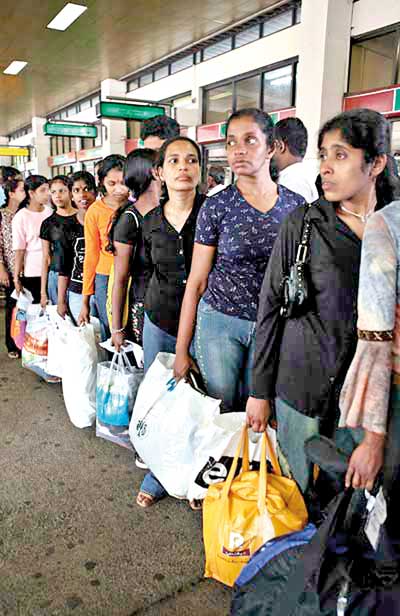Reply To:
Name - Reply Comment
 The practice of sending Sri Lankan women to work as domestic hands in foreign countries began three decades back mainly as a temporary solution to the rising unemployment issue in the country. However, the practice has grown exponentially since then and now it has become something akin to a sub-culture in the country. Although their remittances have contributed to boost the national economy in a significant way, their migration abroad has caused an unprecedented social degeneration.
The practice of sending Sri Lankan women to work as domestic hands in foreign countries began three decades back mainly as a temporary solution to the rising unemployment issue in the country. However, the practice has grown exponentially since then and now it has become something akin to a sub-culture in the country. Although their remittances have contributed to boost the national economy in a significant way, their migration abroad has caused an unprecedented social degeneration.
Too many of these workers live and work in the worst conditions possible with the least access to basic services and fundamental rights, making them disproportionately vulnerable to extortion, violence, discrimination and marginalization. They do go through untold hardships. The most recent incident of a Sri Lankan female domestic worker being sentenced to death by stoning in Saudi Arabia has sent shockwaves through the nation.
In this backdrop, the attention of the Federation of Chambers of Commerce and Industry of Sri Lanka (FCCISL) has been drawn to this significant issue, which arises mainly due to lack of employment and economic woes faced by the people. The FCCISL is confident that it has the capacity to initiate women’s entrepreneurship development programmes islandwide within the span of three years, which could create viable self-employment opportunities for those females planning to go abroad to earn at least double the income of what they can earn abroad. The FCCISL believes that full state support for such an initiative will help it to achieve the targets and aims in a most comprehensive and timely manner.
Making his views known in the backdrop of the social outcry sparked by a Sri Lankan woman being sentenced to death by stoning, FCCISL President Ajith Wattuhewa told the media that it was essential to come up with viable solutions without delay to the prevailing social issues caused by female migration abroad to work as domestic aides.
“As males, we should be ashamed of looking up to the contributions made by female migrant domestic workers to strengthen our national economy. The struggle below the poverty line is the reason why women take a big risk in going overseas for virtual slave jobs because they have no other way of meeting the basic needs of their families here.
This practice began after we introduced the open economic policies. The problems this practice created are multifaceted.
The salaries paid to foreign housemaids especially in the Middle Eastern countries are very law. To earn this, they may have to work for lengthy hours - sometimes even 15 to 18 hours per day. Often the consequences are disastrous. While the maids are in many cases physically abused and in some cases sexually abused, the consequences in the families they leave behind here are also tragic. As Sri Lankans, we can no longer tolerate this sad situation and have to take immediate steps to find viable solutions to overcome the issue.”
Wattuhewa highlighting suggestions submitted by the FCCISL to the authorities on the above issue to be considered for the Budget proposals went on to say, “We should establish a Small and Medium Entrepreneurship Development Authority in Sri Lanka. We submitted proposals in this regard to be considered in the government’s Budget. The women’s entrepreneurship development programmes we have presented could be utilized to harness viable self-employment avenues for females. We have already mapped strategies and plans in this regard under our domestic entrepreneurship development programmes.”
“The females of this country are adopting two undesirable methods to earn quick money when what they get is not adequate to sustain their families. One is to migrate abroad as domestic workers and the other is to enter the sex trade. These issues
we believe can be controlled by generating viable alternative income-
earning opportunities.
